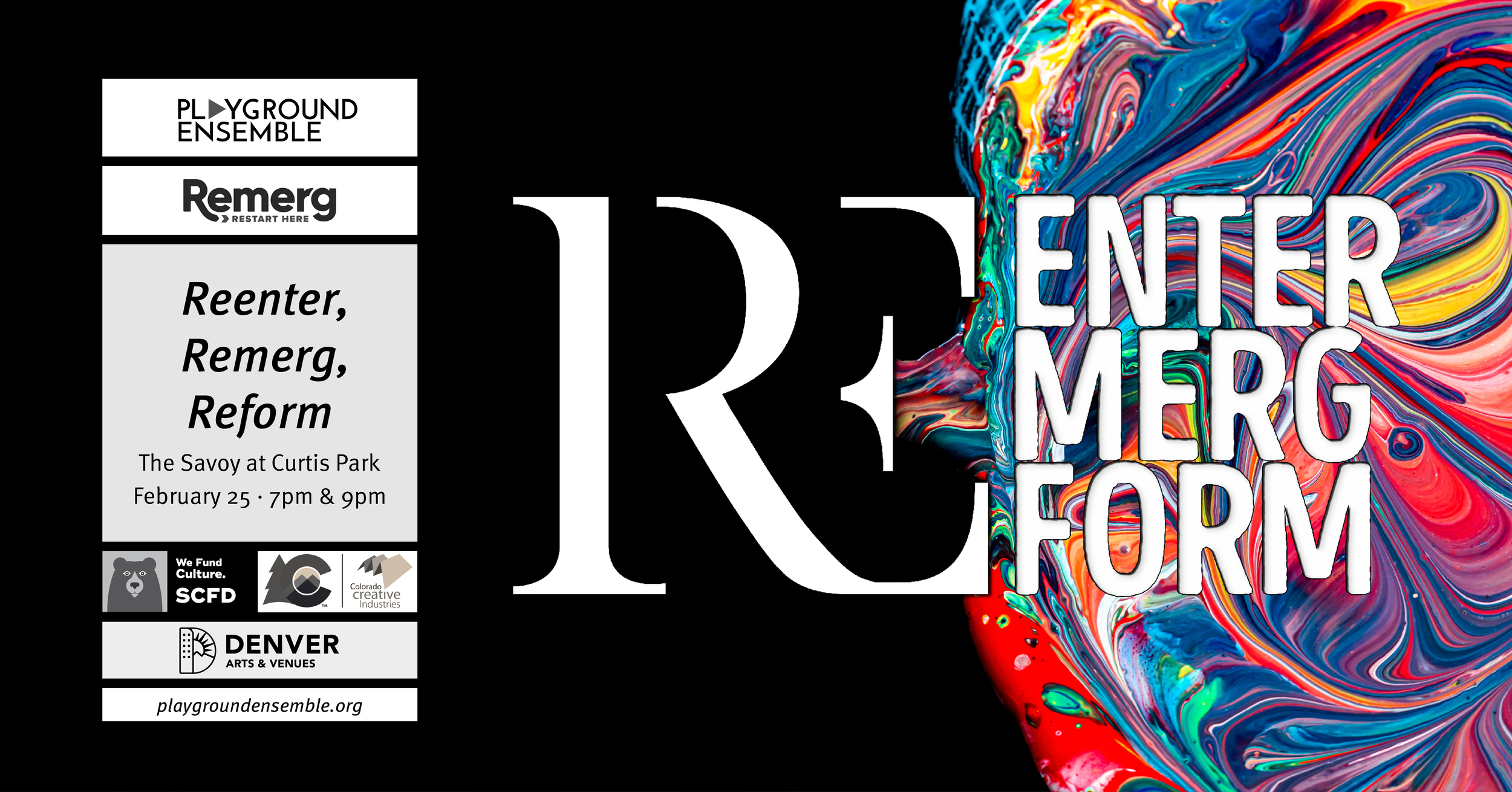February 25, 2021
7:00pm & 9:00pm MST
The Savoy at Curtis Park
General Admission Tickets | $20
In partnership with Remerg, this unique concert program will feature multiple pieces of music that involve texts written by people that were or are incarcerated. The evening will also feature two brand new Playground commissions, including a work written by a recently incarcerated composer. We are also saving space on each program for featured stories and videos presented by the clients of our show partners Remerg.
Proceeds from both shows will go to Remerg.
Patrons will be required to show proof of vaccination upon entry and will remain masked throughout the performance.
All performers are fully vaccinated and will be unmasked during the performance.
Supported by the Denver Music Advancement Fund and Denver Arts and Venues.
THE PROGRAM
H.M. 212 by Claud Kasiah (World Premiere)
This piece began its life in prison, and so is about the journey of one man through prison. Divided roughly into 4 sections, they tell the emotional stories of learning loss, experiencing conflict, finding hope, and finally personal revelation and remorse. The oscillator is specifically tuned to frequencies whose numbers correlate personally with the story’s protagonist, and the symbolic act of throwing an item away represents each year lost incarcerated. Multiple repetitions are used throughout the work to better convey the ideas of unchanged routines in prison.
Claud Kasiah is a 21st century composer who has worked primarily in film. He is comfortable in many styles of music, and studies the art of digital production. Formerly of Denver, he now enjoys his time in Southern New Mexico.
A New Commission by Stacy Fahrion (World Premiere)
I. Echoes from Inside (15 mins, Recorded Voices and Electronics)
Over the past two decades, Playground Emeritus Board Member Richard vonFoerster has written countless letters to incarcerated individuals, building penpal relationships with many people. He collected recordings of phone calls with incarcerated individuals for this piece, asking a series of open-ended questions, including “What do you want people to know about you?" and “What do you miss the most?” Through a collage of these interview recordings, this piece offers a glimpse into what it feels like to be incarcerated in America.
In order of appearance:
Sean Ryan
Paul Neuman
Windee
Bubba Collins
Johnny Ash
Justin
Rusty Weddle
Norton
Jeremy McCullough
Joey Carroll
Sasha
D Bowen
John Modie
II. Buried Alive (3 mins, Narrator & String Trio)
“Buried Alive” is a poem written by Rick Anderson and Nathan Ybanez, published in the book Unlocked Poetry: with Professor Wayne A. Gilbert and the Lyrical Vagabonds.
Rick Anderson is a poet incarcerated in Sterling Correctional Facility. He works in the prison library and typed the entire manuscript of Unlocked Poetry. Writing poetry helps Rick endure the hardships of prison and often returns him to his beloved nature.
Nathan Ybanez spent more than two decades in Colorado’s harshest prisons, and is now free. In prison he learned the art of poetry, which helped him endure the violence and indignities of prison. He continues to write to unlock the magic of deep engagement with daily life. Nathan’s chapbook of poetry, Memory and Form, was recently published by Liquid Light Press.
One goal of this piece is to disturb public apathy around incarceration.
Buried Alive
Written by Rick Anderson & Nathan Ybanez
My contemplative moments
are like motes of dust
swirling in bright beams
burning through the shadows
Each a thing I mean to do:
a regret, an unfulfilled dream,
a tear, a kiss, a goodbye.
I live in these siren flashes
sucking at them like a leech
growing fat on the suffering.
Time is a terrible circle
closing in on itself,
cutting away at an empty heart.
I search in vain for the moment
I grew too large in my loss
when I turned to this flailing morbidity
from an illusive future
to a ransacked past.
There’s no light here - not really.
These nostalgic pyres
are as meaningless
as tears in the rain.
But things continue to grow
and I claw for my salvation.
Across my Rubicon,
alone in my grave,
beholding only echoes of all
the people I used to be,
I wonder what god
would deem it just
for an old man
to suffer the follies
of an arrogant youth.
Coming Together by Frederic Rzewski
Narrated by Eric Davis (Bio below)
In September 1971, a riot broke out at the Attica Correctional Facility in upstate New York, demanding improved health care, sanitation, and food, as well as an end to beatings. Four days of tense negotiations followed, culminating in the storming of the prison by state police as ordered by Governor Nelson Rockefeller. At least 43 people died, including 33 prisoners.One of those was Samuel Melville (born Grossman; he borrowed Melville from the American novelist), a draftsman who became radicalized by apartheid when his company put him to work on new bank offices in South Africa. He became increasingly active in political demonstrations, which escalated into a series of bombings in 1969. Melville pleaded guilty to conspiracy and bombing the Federal Office Building in Manhattan and was transferred to Attica, where he became one of the leaders of the prison rebellion. He was shot and killed during the retaking of the complex. A book of letters he wrote from prison was posthumously published, and Frederic Rzewski took his text for Coming Together from Melville’s letter of May 16, 1971 (which was first published separately in a magazine):
"I think the combination of age and the greater coming together is responsible for the speed of the passing time. it’s six months now and i can tell you truthfully few periods in my life have passed so quickly. i am in excellent physical and emotional health. there are doubtless subtle surprises ahead but i feel secure and ready. As lovers will contrast their emotions in times of crisis, so am i dealing with my environment. in the indifferent brutality, incessant noise, the experimental chemistry of food, the ravings of lost hysterical men, i can act with clarity and meaning. i am deliberate – sometimes even calculating – seldom employing histrionics except as a test of the reactions of others. i read much, exercise, talk to guards and inmates, feeling for the inevitable direction of my life."
“As I read it, I was impressed both by the poetic quality of the text and by its cryptic irony,” Rzewski wrote. “I read it over and over again. It seemed that I was trying both to capture a sense of the physical presence of the writer and, at the same time, to unlock a hidden meaning from the simple but ambiguous language. The act of reading and rereading finally led me to the idea of a musical treatment.”This treatment is the recitation of the text, a few words at a time, over a driving pentatonic bass line of steady 16th notes. The instrumentation is open and the piece can be performed by any number of players, though usually 8-10. Only the bass line is notated; all of the other parts are derived from it in ways specified by the composer. The overall form is also clearly defined, as are dynamics and articulation. (John Henken)
Narrator, Eric Davis
Eric Davis grew up skiing and roaming the mountains around Idaho Springs, Colorado. But he longed for a life in the shining city down the hill—Denver. By the time he was eighteen years old, he had not only lived in Denver, but he had also found a way to make choices that altered the lives of countless people. For the next thirty-four years he was incarcerated in the Colorado Department of Corrections. During those three decades Eric made a concerted effort to become a man of integrity, who looked to affect the world in positive ways. He was a member of the Shape Up program at the Arkansas Valley Correctional Facility and the Territorial Correctional Facility. This program brought teenagers into the facilities to spend time with the men of Shape Up who offered advice to these younger men heading down the wrong path in life—a path similar to the one the men of Shape Up had taken. Rather than continuing to engage in more destructive behavior while inside, Eric constantly sought out productive, meaningful programming and activities. Then in 2019, DU PAI found him. While working on the Fremont Correctional Facility’s Pens & Paradigms newsletter, he and that team were approached by DU PAI and CDOC with the idea of creating a newspaper written and produced by men and women in CDOC. With that, The Inside Report was born, and Eric was officially a part of the DU PAI family. In February of 2021, Eric was granted early parole by Governor Polis following Eric’s participation in the Juveniles Convicted as Adults Program. DU PAI wrapped their arms around Eric as he reentered the community he had abandoned so long ago, and he is now officially an employee of DU PAI. Eric hopes to work every day to change the world with his new family and all who have supported and encouraged him for so many years.
Additional works to be announced including pieces performed by Remerg client and screenings of videos created by Remerg in collaboration with the Denver Sheriff’s Department, highlighting post-release resources.


